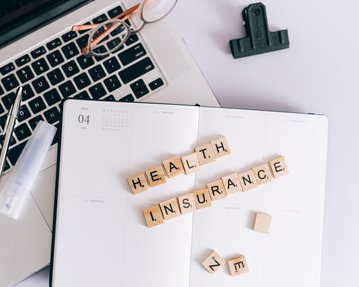

Welcome to Germany
Have you received your letter of admission? Then it's time to start planning your study abroad programme at the SRH Berlin University of Applied Sciences. An important milestone is your residence permit.
Your residence permit is only valid in combination with your passport. If your passport expires before your residence permit, your residence permit is also no longer valid. If you leave Germany for more than 6 months, your residence permit will expire automatically.
First steps in Germany:
- Start looking for accommodation and find a flat (shared room, flat, etc.). You need a correct address to complete your registration.
- After moving into your new flat/room, get an appointment at the Bürgeramt to register your address. Please note that this must be done within 2 weeks of your move date.
- Don't forget to take out German health insurance. You cannot start your studies without proper health insurance.
- You have a national visa (D): Remember that you have to change your current visa into a residence permit within 90 or 180 days after your arrival in Germany (please check the entry stamp and visa conditions). This must be done at the Aliens' Registration Office in your city.
- You do not need an entry visa: Please apply for your residence permit within the first 90 days after arrival in Germany (please check the stamp in your passport).
- Some students, e.g. exchange students, who stay in Germany for less than one year, can obtain a national (D) visa valid for up to 12 months instead of a national entry visa for 90 days. These students do not need to apply for a residence permit after their arrival in Germany.
- Swiss nationals: Please apply for a "Residence Permit-Switzerland" within 90 days after your arrival in Germany.
You will find further information in the "Student Welcome Guide", which you will receive together with your admission documents.


How & where do I get my residence permit?
At the time you need to apply for or renew your residence permit, we recommend that you live in the city where you study. In case you do not live in the city, the immigration office can probably only give you a fictitious certificate of 3 months.
- Where do I have to go?
Option 1: State Office for Immigration (Landesamt für Einwanderung, LEA)
Keplerstrasse 2, 10589 Berlin
Please use the Online Contact Form to make an appointment. You may also submit supporting documents. Please apply just about 8 weeks before your visa/residence permit expires.
Option 2: at SRH Berlin, we offer a Residence Permit Service. The university submits your documents to the authorities. Please make an appointment (8 weeks before your visa expires) with the Residence Permit Service to use this service.
- Residence Permit for study: For the application you need the following documents and proofs. Fill in the application form and bring the relevant documents and proofs with you. (How do I fill in the application form?)
- Residence Permit Extension: For the application you need the following documents and proofs. also fill in the study prognosis.
- Job Seeker Permit: For the application you need the following documents and proofs. also get the document “Confirmation of Degree Completion”.
- Where do I have to go?
Foreigners' Registration Office Dresden
Theaterstraße 13
01067 Dresden
Please book your personal appointment early (6 weeks before your visa expires). You can book your appointment via email: termin.auslaenderbehoerde@dresden.de
- Residence Permit for study: For the application you need the following documents and proofs. Fill in the application form and bring the relevant documents and proofs with you. (How do I fill in the application form?)
- Residence Permit Extension: For the application you need the following documents and proofs. Also fill in the study prognosis.
- Jobseeker: For the application you need the following documents and proofs. Also complete the Letter of Completion of Studies.
- Where do I have to go?
Either to one of the foreigners authorities in your district or to the
Hamburg Welcome Center
Adolphsplatz 1
20457 Hamburg
Please book your personal appointment early (6 weeks before your visa expires). You can also book your appointment online: Foreigners' Affairs for Professionals - Hamburg Welcome Portal - hamburg.de
- Residence Permit for study: For the application you need the following documents and proofs. Also fill in the application form and bring the relevant documents and proofs with you. (How do I fill out the application?)
- Residence Permit Extension: For the application you need the following documents and proofs. Also fill in the study prognosis.
- Jobseeker: For the application you need the following documents and proofs. Also complete the Letter of Completion of Studies.
Questions & Answers
Please go directly to the nearest federal police office and report it. They will give you a notice of loss. If you lost your passport, you have to go to the embassy to apply for a new one. After that you can apply for your visa/residence permit. If you have only lost your residence permit, then bring a copy of this notice of loss, your passport and a biometric photo of yourself to the Residence Permit Service of SRH University.
You may work up to 140 full days (full day = 8 hours per day) or 280 half days (half day = 4 hours) during the calendar year. Self-employment is allowed.
For a total stay of up to 90 days within a period of 180 days. This regulation only applies to visits for tourism purposes. Attention! In order to study or do an internship in another country of the European Union, you may have to apply for a study or internship visa. Please enquire at the respective embassy about the requirements.
This can be relevant if you want to do an exchange semester or an internship abroad.
You are welcome to bring your family. We advise you to apply directly for a family visa and enter the country all together. You can find more information about this on the page of your embassy. It is also possible to join your family, but the process is more complicated. You can find more information on the page of your city's national office.
You may change your degree programme, but it is recommended that you do so in the first or second semester. In addition, you should be able to prove that you can have credits recognised for the new programme. You must also be able to show that you have exmatriculated from the old programme and enrolled in the new programme. With the exception that you are not allowed to change from Master to Bachelor.
In Berlin it is not so easy to get an appointment for registration, but you can search on the website or call +49 30-115 directly. It's best to call in the late afternoon, as there are often appointments for the next day.
Generally, you are only allowed to take one semester off or extension. For the second semester of leave or extension, you must apply for it and then your situation will be analyzed by the state office to see if you have been properly pursuing your studies and making adequate progress.
If you are not a citizen of the EU or of an EEA state (Iceland, Lichtenstein, Norway), you have applied for a study visa at the German Embassy in your home country. Now you must apply for a residence permit (this is not an extension of your visa) in Germany.
If you are from Andorra, Australia, Brazil, El Salvador, the UK, Honduras, Israel, Japan, Canada, Monaco, New Zealand, San Marino, South Korea, Switzerland, the USA, - you do not need to apply for a student visa, but you will get a stamp in your passport when you enter Germany, and this is evidently your German entry visa.
The immigration office will let you know why, and you can try again to apply for a residence permit or a new visa (better prepared).
We recommend that you apply as soon as you have all the necessary application documents, at latest 6-8 before your residence permit expires.
You must carry your passport and your residence permit together wherever you travel. But you may also carry a copy of your passport.
Either you go yourself, you get the appointment online or you hand in your documents to the Residence Permit Service, and we might be able to ask for an expedited process (ca. 2 weeks)
In several drugstores (dm), in the automatic photo machine or at professional photo studios.
You should present a certificate of a blocked account at a German Bank with EUR 11,208 (submit the document even if your amount is lesser) OR submission of a declaration of commitment by a third party in Germany on an official form OR scholarship OR a notarized declaration from parents for the duration of your studies with their last 6 months bank statement and their colour passport copies. Documents must be in English or German.
You should present last 6 months bank statements ideally with a 934 EUR monthly income. Lesser income is also fine.
Yes.
Expatrio or Finitiba.
A blocked account is an account that is subject to foreign exchange controls in a country that restricts the amount of its currency that can be transferred to other countries or exchanged into other currencies. In short it is an account, which is not freely accessible to the account holder and to prove adequate means often requires a blocked account.
In order to apply for your residence, permit you should "fill up" your blocked account for the time period that you are applying for i.e. 934€ x 6 months (half a year) or 934€ x 12 months (a year).
Yes, but a letter of confirmation from your health insurance providers (hot older than three months) can help you as well.
Yes, 120 full days and 240 half days in a calendar year. In addition, foreign students are given the opportunity to take on part-time student jobs at the university or at another academic institution without any time restrictions. Student secondary employment also includes employment that is limited to university-related activities in connection with the studies in organisations close to the university (such as tutors in student union halls of residence, activities in the counselling work of the university communities, the Asten and the World University Service). In the event of difficulties in demarcation, the university should be involved (16b.3.1.2. student secondary employment).
With your residence permit you are allowed to stay out of Germany for up to six months (180 days) without losing the status of your residence permit. In addition, you must contact the Embassy of your host country to ask whether you must apply for an additional work visa.
If it is a mandatory internship that is no problem. If it is a voluntary internship, then you are only allowed to work 20 hours for 240 days or 40 hours for 120 days.
You need a job seeker permit or a work permit/blue card.
No, but it can help. Add proof of job interview etc.
The job seeker permit lasts for 18 months and you have 18 months to find a job in your field.
As soon as you have a job offer which corresponds to your qualifications, you can choose whether you want to apply for a German residence permit or an EU Blue Card for the next part of your stay. Various conditions are attached to both these residence permits. Depending on what you are planning to do in the future, either the German residence permit or the EU Blue Card can be advantageous for you. If you intend subsequently to live and work in another EU state, the EU Blue Card may be more advantageous for you than the German residence permit. As the choice of residence permit largely depends on your personal situation, get the advice of your local foreign nationals' registration office when you apply.
You have six months to have a transfer done. During this time, you should always take both passports with you when you want to identify yourself. It is only important that you remain in possession of the "old" passport, because the current residence title is stuck in it. The procedure is similar everywhere in Germany, but to be on the safe side, check how it is done in the city where you are registered. In Berlin, the transfer can be done through the city government or as an application through the University Service. That is, if you are registered in Berlin, you can submit your documents to our Residence Permit Service at Campus Berlin or by yourself at Immigration Office Berlin. You can find the information of the Berlin State Office for Immigration here:
www.berlin.de/einwanderung/en/
At Campus Dresden you can get assistance, however for submission you should go by yourself to the Immigration Office. You can find the information here:
https://www.dresden.de/en/city/anliegen/Foreigners_Service_Office.php
At Campus Hamburg you can get assistance as well, however for submission you should go yourself to the Immigration Office Hamburg. For more information please click here:
www.hamburg.com/welcome/entry-residence/immigration-registration-offices/
Generally, you must leave Germany if you are unable to find a job but that will change after the new changes in the immigration laws in Germany from November 2023.
You may change your degree programme, but it is recommended that you do so in the first or second semester. In addition, you should be able to prove that you can have credits recognised for the new programme. You must also be able to show that you have ex-matriculated from the old programme and enrolled in the new programme. With the exception that you are not allowed to change from Master to Bachelor. You must inform the immigration office immediately as soon as you change university of the degree program.